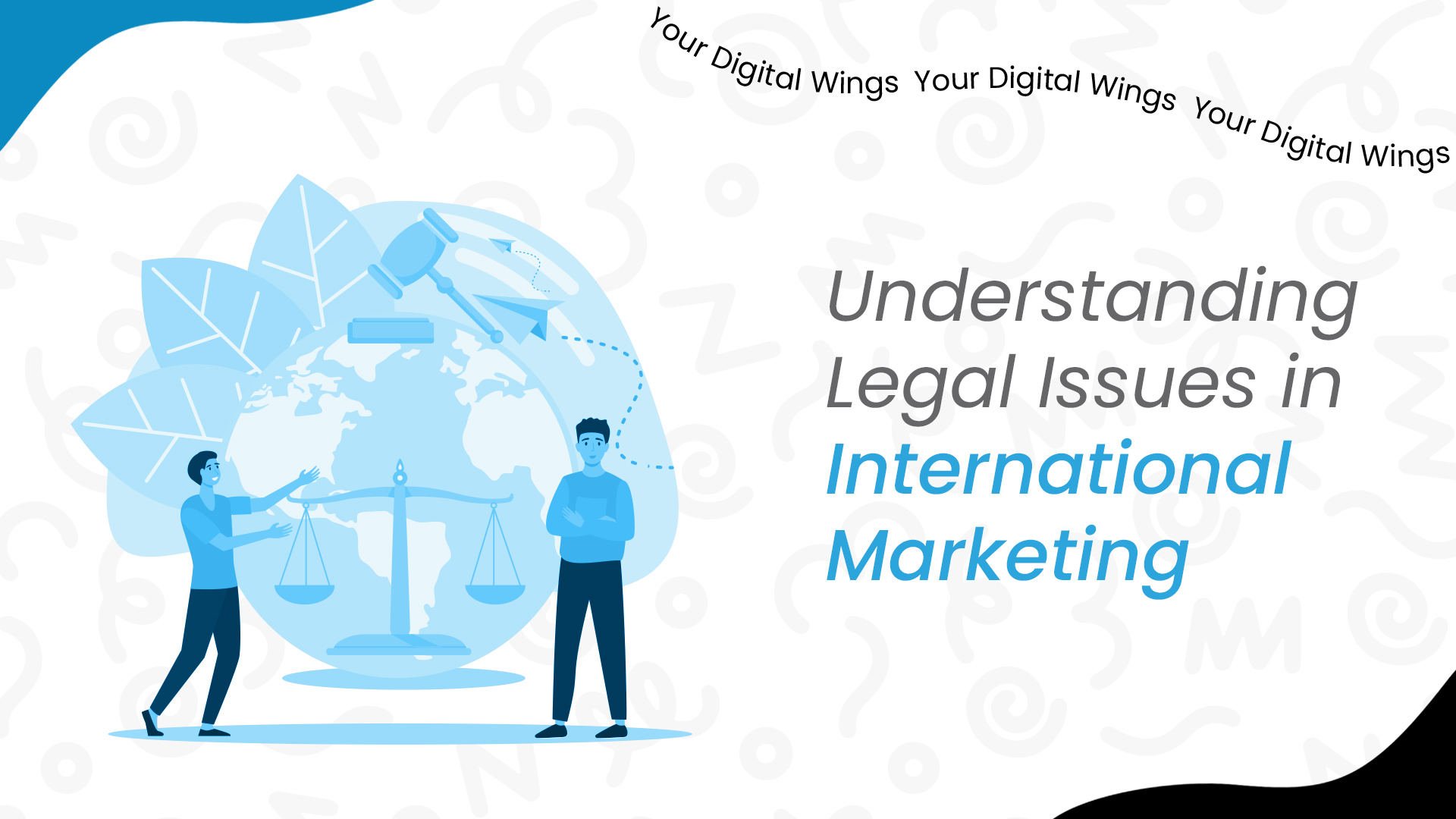Businesses looking to expand their operations in the global territory are so often faced with legal issues in the international marketing. International expansion is necessary to reach new consumer profiles and strengthen the brand’s leadership. Since internationalization is a necessity to outgrow your competitors, businesses must overcome legal issues smartly. This article explores the legal challenges and the importance of understanding legal issues in international markets.
Overview of Legal Frameworks in International Marketing
When you venture out into the global market, you have to go through a cobweb of legal issues in international marketing. First off, we have Intellectual property rights (IPR). It protects brands, patents, and trademarks from unauthorized use and infringement. Data protection and privacy laws regulate how companies collect, store, and process personal information. It essentially addresses the legal issues in international marketing related to consumer privacy.
Advertising and marketing rules can be quite different from one country to another. They usually require honesty and ban any misleading claims. When it comes to e-commerce and online marketing, there are laws that control digital transactions and protect consumer rights, which means you need to follow the standards of each jurisdiction you’re operating in.
Ethical considerations in international marketing are also crucial. Companies need to maintain integrity, avoid exploiting anyone, and respect cultural differences. Navigating legal risks means staying updated on and compliant with various international laws. This helps to avoid fines, legal disputes, and potential damage to your reputation.
In short, understanding these legal frameworks is key to running successful and lawful International Marketing Strategies.
Intellectual Property Rights
Intellectual property has various types and some countries recognize more than others. The most popularly known types include copyrights, patents and trademarks, and trade secrets. Intellectual property rights are the rights a business holds over its intellectual products or services.
If you are a business owner, make sure to register your company in whichever region or country you are operating in. This will help you to avoid any infringement of intellectual property. If your business is being operated in three or more EU countries, you are eligible to apply for EU-wide protection. However, you can only choose to file in specific countries where your target markets are limited. Intellectual property rights always take center stage whenever we discuss legal issues in international marketing.
Data Protection and Privacy Laws
The continuous expansion of the digital economy has made it necessary for businesses to keep themselves updated on the latest global data protection and privacy laws. Regulations such as the General Data Protection Regulation (GDPR) affect how a business stores, collects, and processes personal data of residents or citizens.
Businesses that regularly monitor the ever-evolving international standards won’t have to suffer from the legal repercussions. Not only that, staying within legal boundaries enables you to earn consumer’s trust. Therefore, a company’s legal team should ensure compliance by regularly updating and reviewing privacy laws to stay out of legal issues in international marketing.
Some of the effective measures to ensure data protection and privacy laws are the following:
- Regular employee training on privacy law changes
- Active participation in international privacy discussions and forums
- Assessment and revision of data protection policies
Understanding International Data Protection for Marketers is crucial for ensuring compliance with various data protection and privacy laws across different countries.
Advertising and Marketing Regulations
Advertising and marketing regulations play a pivotal role in understanding legal issues in international marketing. These regulations differ significantly across countries, requiring marketers to tailor their strategies to meet local standards. For instance, some regions have strict guidelines mandating truthfulness in advertisements, prohibiting deceptive claims, and ensuring transparency. This is crucial for building consumer trust and avoiding legal repercussions.
In addition, there are specific rules around certain product categories, such as health, finance, and food, which often require more stringent compliance. Understanding these regulations helps marketers avoid costly fines and legal battles. Moreover, digital marketing has added another layer of complexity, with laws governing online advertising, influencer marketing, and data usage. Navigating these varied regulations ensures not only legal compliance but also enhances brand reputation and consumer trust on a global scale.
E-commerce and Online Marketing
Navigating the world of e-commerce and online marketing can be quite a challenge, especially when it comes to legal issues in international marketing. Here are some common hurdles.
- Data Privacy: Different countries have varying data protection laws. Complying with these regulations is crucial to avoid legal issues in international marketing related to data breaches and consumer privacy.
- Consumer Rights: E-commerce laws differ globally, covering aspects like return policies, warranties, and dispute resolution. Understanding these is key to sidestepping legal issues in international marketing.
- Taxation and Duties: International sales often come with complex tax regulations and import duties. Mismanagement here can lead to significant legal issues in international marketing, including hefty fines and penalties.
- Advertising Standards: What’s acceptable in one country might be prohibited in another. Ensuring your online ads comply with local advertising laws helps prevent legal troubles.
- Payment Methods: Different regions prefer different payment methods, each with its own legal framework. Ensuring secure and compliant transactions is essential for smooth operations.
Overcoming these challenges requires staying informed and adaptable, but it’s all part of the exciting world of international marketing!
Ethical Considerations in International Marketing
Ethical considerations play a crucial role in shaping the dynamics between businesses. The following guidelines can help you to make a positive brand image and reputation among your customers:
- Cultural Sensitivity: In international advertising, it’s essential to respect cultural nuances to avoid offending potential customers. Symbols or imagery considered inappropriate in specific cultures should be avoided to prevent legal issues in international marketing.
- Truthfulness and Transparency: Ethical Marketing Practices It require providing accurate information about products or services, and avoiding misleading claims. These practices builds consumer trust and helps avoid legal issues in international marketing.
- Social Responsibility: Advertisers should promote sustainable practices, support social causes, and avoid harmful content. Steering clear of ads that reinforce stereotypes or unhealthy behaviors is a prime example of being a socially responsible business.
- Privacy and Data Protection: Respecting privacy and protecting personal data are crucial. Advertisers should comply with data protection laws and obtain consent for data use, ensuring trust and a positive brand image.
- Local Laws and Regulations: Adhering to local laws and regulations is vital. Advertisers must be familiar with legal requirements in each country, including advertising standards and consumer protection laws. It ensures compliance and prevents legal issues in international marketing.
By following these guidelines, companies can build strong reputations, connect with global audiences, and practice responsible and ethical marketing.
Compliance with Global Trade Laws
Effortlessly integrating international trade laws and regulations into your business strategies is a tough task. Challenges such as customs procedures and enforcement of international agreements are difficult to overcome in one go. Global Trade Compliance and Laws require a comprehensive understanding of trade agreements between both parties. In this regard, some exporting firms are faced with legal complexities that arise from diverse international standards and the execution of cross-border transactions.
Remaining vigilant and actively consulting with legal advisors and trade experts, such as those from the International Trade Administration or partner institutions, allows a company to effectively navigate legal issues in international marketing. This proactive approach ensures compliance with international contract stipulations and customs formalities, enhancing efficiency and reducing potential risks.
Navigating Legal Risks
To thrive in the international market, businesses need to come up with contingency plans and smart strategies to overcome legal issues in international marketing. Companies must adapt and construct meticulous legal strategies for smooth sailing in international waters. Securing clear terms for foreign investments and collaborations, especially in joint ventures, is essential to minimize risks and build trust.
Additional challenges arise when language barriers and cultural differences intersect with legal procedures, requiring a keen awareness of these nuances to ensure clarity and agreement in negotiations. Successfully navigating these risks is crucial for the success of any business expanding into the global economy.
Conclusion
Understanding and addressing legal issues in international marketing is paramount for businesses expanding globally. From intellectual property rights to data protection and advertising regulations, compliance ensures trust, mitigates risks, and fosters sustainable growth. Companies must stay informed and proactive, adapting strategies to meet diverse legal requirements across markets. By doing so, businesses can navigate complexities effectively, safeguard their reputation, and capitalize on global opportunities with confidence. Stay vigilant, stay compliant, and thrive in the international marketplace.
Seeking mastery in navigating the legal intricacies of international marketing? Look no further than Cretesol Tech. Our seasoned professionals stand ready to empower your business with compliance expertise, paving the way for unparalleled global success.
FAQs
What are the main legal issues in international marketing?
Intellectual property rights, advertising regulations, data protection laws, and compliance with local regulations are key concerns.
How can businesses protect their intellectual property in global markets?
Register trademarks and patents in target countries, monitor for infringements, and use contracts to safeguard IP rights.
What are the best practices for complying with data protection laws?
Regularly update privacy policies, obtain consent for data processing, implement secure data storage practices, and provide ongoing staff training on data protection.

 United Arab Emirates
United Arab Emirates